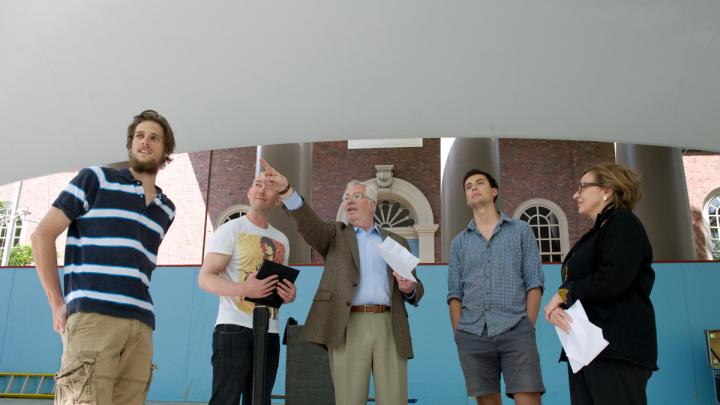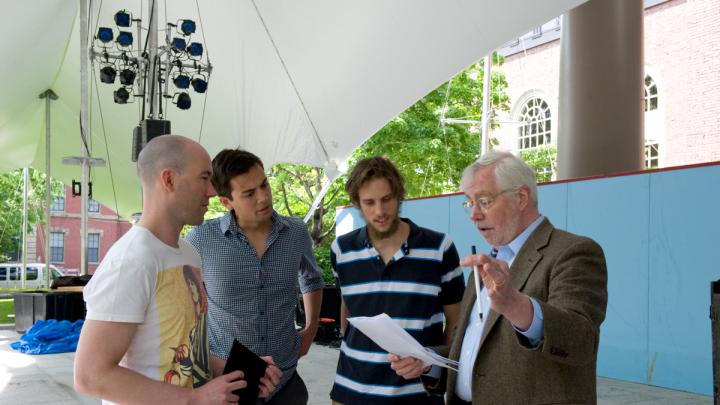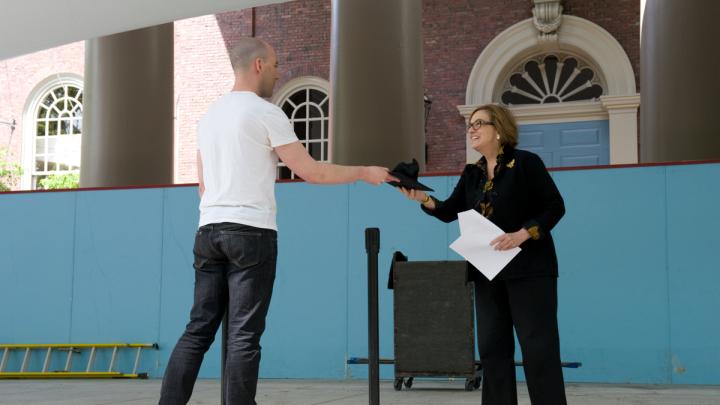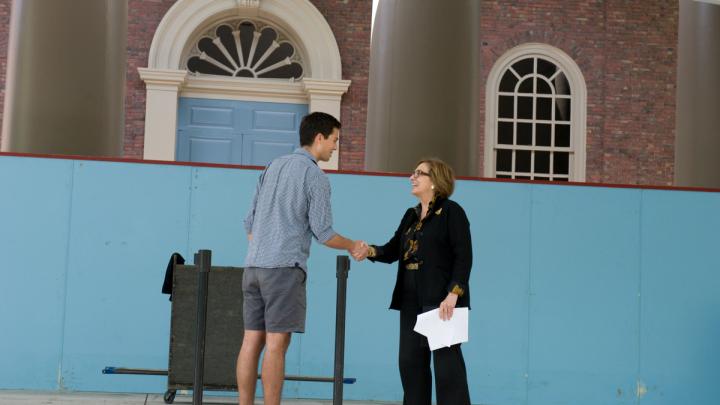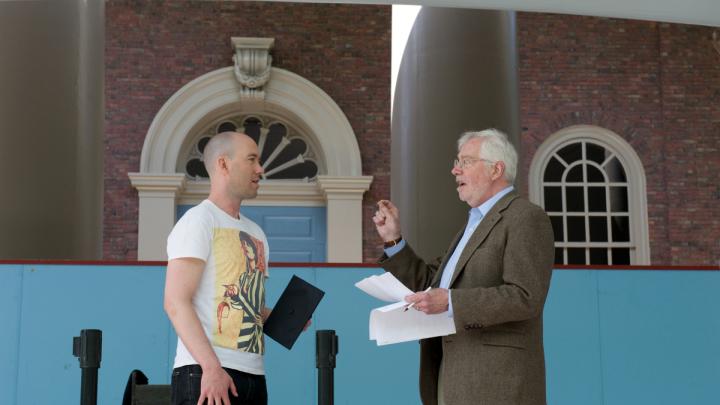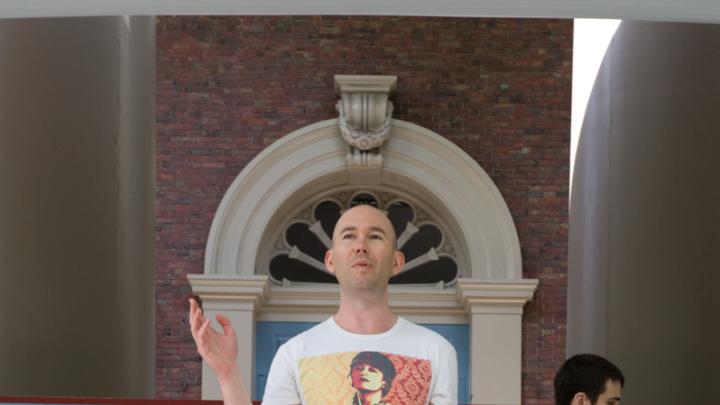The history of Commencement speeches at Harvard stretches back for centuries, but the 273-word sentence in this year’s Latin Salutatory may well be the longest one ever uttered at “these festival rites.” In his colossal string of words, Michael Kenneth Velchik ’12 purports to summarize the entire undergraduate experience of his College class, albeit in roughly four minutes, rather than four years. His entire speech, which lasts about five minutes, is consequently only 10 sentences long. Nonetheless, “Writing it took longer than I figured it would,” says Velchik, lapsing into English.
Three centuries ago, none of the three speeches given by graduating students at Commencement was in English. The Latin, Greek, and Hebrew addresses reflected a different emphasis in the days when admission to Harvard College depended solely on an oral exam in Greek and Latin administered by the president and one faculty member. Today, two of the three speeches delivered during the morning exercises are in English. In addition to the Latin Salutatory—always first, immediately following the opening prayer and the anthem Domine salvum fac by Charles Gounod (its lyrics are also in Latin)—there are the Senior English address, by a graduating senior, and the Graduate English address, by a degree recipient from one of the graduate schools.
The Committee on Commencement Parts, whose name reflects the archaic designation for the three student speeches, supervises the student orations. R.J. Tarrant, Pope professor of Latin and interim dean of the Graduate School of Arts and Sciences, chairs the committee, which has nine voting members (eight from the Faculty of Arts and Sciences and one from the Harvard Kennedy School.
Until a few years ago, all Commencement-goers received the Latin text of the salutatory in their programs, but only the graduating seniors had English translations as well, allowing them to laugh or otherwise respond at appropriate moments. “Some parents used to marvel that all the seniors understood Latin,” says Tarrant. Today, everyone receives an English translation as well as the Latin original. (It took 383 English words to translate Velchik’s humongous Latin sentence.)
The process of choosing the speakers has three phases. First, interested students submit written texts; typically, Tarrant says, there will be about three dozen from the senior class, two dozen from the graduate schools, and about five in Latin. No rule restricts the salutatory to classics concentrators, but in practice, the Latin orator is nearly always one of about 20 seniors receiving bachelor’s degrees in that field. These aspirants submit an English translation along with their Latin prose.
The committee winnows the submissions down and holds auditions; this year, three of the five Latin entrants were invited. For each of the other two slots, they invited about 10 candidates to speak. Sometimes an orator is chosen after the first round of auditions, but often there is another round, the “finals,” before the committee decides. For all the orations, the goal is a five-minute speech at most. If an orator runs more than a minute long in rehearsals, he or she is asked to trim the text because, on the day itself, a speech rehearsed at five minutes will take, with pauses for audience reactions, six or seven minutes to deliver. Tarrant himself works with the Latin orator on pronunciation and fluency.
Though all the speeches usually include some humor, the salutatory always does. “Nothing written says it should be amusing,” Tarrant explains, “but in practice the Latin address runs in a lighter vein than the English speeches. They usually exploit the absurdity of talking about contemporary things in an ancient language, and draw attention to that incongruity.” Velchik’s text, for example, asserts at one point, “attestati Linsanitatem” (we were all witnesses to “Linsanity”).
The orators are coached during rehearsals in Tercentenary Theatre by both Tarrant and Elise Morrison, preceptor in expository writing and associate director for speaking instruction at the Bok Center for Teaching and Learning. Rehearsing outdoors, says Morrison (an actress with extensive theatrical training) lets the speakers “get a feel of the scale. You need big gestures for a big space.”
A little more than a week before Commencement, Morrison held a session with this year’s speakers, who delivered their memorized renditions on the steps of Widener Library as workmen built the Commencement stage in front of Memorial Church. She encouraged Velchik to use “tempo changes through the big long sentence” to keep it flowing with variety. His speech, typical for the Latin Salutatory, ends on a note of high energy, and Morrison suggested that he aim for a similarly zestful tone at the outset.
After the first run-through, she asked Senior English orator Anthony Hernandez ’12 to try it again, but “Tell it to us like a stand-up comedian—you are working the crowd, and we think you’re hilarious.” The result was a “big improvement,” she told him afterward. “That adds some ‘twinkle’ to it.” Her prescription for Jonathan Service, Ph.D. ’12, the Graduate English orator, was to “bring some spontaneity to it. Do it as if each thought is occurring to you right now.”
In actuality, of course, the Commencement parts are the polar opposite of spontaneous remarks. Yet they can sound fresh when delivered well. And the committee members can improvise, too. Tarrant recalls a Latin orator who chose to salute the different graduate faculties by name, and “gave a shout-out to the School of Dental Medicine as the Schola Dentium—the ‘school of teeth,’” he says. “In Latin, that is completely absurd. But I couldn’t bear to take it out.”
